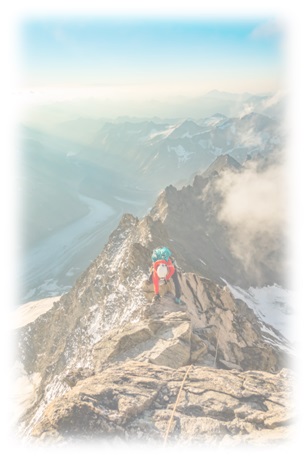A Coaching Model By Marija Rooz, Life Coach, GERMANY
How to Use SURMOUNT Coaching Model
 I am Maya Rooz, and soon to be a Certified Professional Coach. I am also a Professional Organiser and I help individuals declutter their minds and homes. Together we remove the unnecessary and the obsolete: limiting beliefs, negative perspectives, unwanted commitments, and physical items that work against rather than for my clients.
I am Maya Rooz, and soon to be a Certified Professional Coach. I am also a Professional Organiser and I help individuals declutter their minds and homes. Together we remove the unnecessary and the obsolete: limiting beliefs, negative perspectives, unwanted commitments, and physical items that work against rather than for my clients.
I chose SURMOUNT as my coaching model because it depicts perfectly what my clients come to see me for and how we work together. Usually, they reach out to me when they are so overwhelmed with the chaos in their physical environment that they have no other option but to act on it. Most often, the chaos in the home is a physical manifestation of the chaos in the mind and this is why I strongly believe that coaching plays a significant role in the process and precedes any physical decluttering.
SURMOUNT Definition
SURMOUNT – verb (used with object)
- to mount upon; get on the
- top of; mount upon and cross over: “To surmount a hill”.
- to get over or across (barriers, obstacles, etc.).
- to prevail over: “To surmount tremendous difficulties”.
My clients, who most often tend to be busy working mothers who are trying to juggle parenthood, career, self-care, relationships, friendships, and much more are spread so thin that the home environment suffers as a result. However, according to research, clutter causes stress and it’s a vicious circle. When surrounded by clutter, cortisol – the stress hormone is released and the brain sets off the alarm signals which then affect our entire body in various ways (heartbeat, blood sugar levels, etc). The body’s stress response system is usually self-limiting. Once a perceived threat has passed, hormone levels return to normal. A chronically cluttered environment can lead to a constant low-grade fight or flight response, making us more prone to stress. This phenomenon has been proven to show up, especially in women and men who do more housework.
SURMOUNT Coaching Model
 This model is used to help my clients conquer the mountain they see ahead of them. I have used some mountaineering terms to help describe the process. This model has been developed for my particular niche, but can be used in other coaching niches as well. The secret ingredient in this model lies in the conscious sub-steps that encourage self-acknowledgment and gratitude.
This model is used to help my clients conquer the mountain they see ahead of them. I have used some mountaineering terms to help describe the process. This model has been developed for my particular niche, but can be used in other coaching niches as well. The secret ingredient in this model lies in the conscious sub-steps that encourage self-acknowledgment and gratitude.
Step 1 – Confirm Which Summit to Climb (Visualize the Goal), and Find and Feel the Why
In the case of my decluttering clients, climbing the summit is conquering the clutter in the home. Usually, the client is looking for a way to get more organized, spend less time tidying, and feel less stressed when at home. When exploring during this step, it is critical to identify the main drivers behind the goal and visualize a home that is a sanctuary and a charging station. During this stage, we set clear measures of success to help the client gain clarity on what it is that they want to achieve. Having clear goals in place e.g. a visual of their home office, what it would look like, how they would feel when working in it, what they would see around them, and how it would make them more productive.
Step 2 – Identify the Gear and the Fuel to Propel Uphill (Strengths, Capabilities, Values)
Most of the time, clients come equipped with limiting beliefs and fears. “I am disorganized and cannot keep a tidy home”. They struggle to see their own power. This is the phase where we explore what the current clutter situation is and what, if anything, does work. More often than not, the client will find areas in their life that are working. Furthermore, we work on exploring the client’s values and how those play a role in the overarching goal. Clients who want to declutter can have values like leisure time, family, learning, and hobbies, and clutter is getting in the way of them making time and energy to live in line with those values.
Step 2A – Pause and Acknowledge
At this point, we acknowledge that by just coming to coaching the client has already taken steps. What an empowering place to be! Here we explore what other areas in the client’s life are indeed working where being organized plays a role. At this point, a shift usually happens and the client taps into their own experience and strengths to start shifting the narrative.
Step 3 – Define What Equipment Is Missing, and What Training Needs to Take Place in Preparation for the Ascent
In this step, clients start to see a new world of opportunities, where they can visualize and explore what their new environment would look like in even more depth. We start exploring what options could work. For individuals struggling with guilt when letting go of items, we explore how gratitude can be used as a tool to let go.
Step 3A – Pause and Acknowledge
In this step, we acknowledge the progress made thus far utilizing gratitude from step 3. At this point, the clients have shifted their views of their belongings as merely tools that make their life better and more joyful, rather than remaining prisoners of the clutter. Gratitude is the antidote to clutter.
Step 4 – Commit & Take Action
At this point in the coaching process, the client is ready to take action. In many cases with decluttering coaching clients, this actually means recruiting a “Sherpa” (aka Professional Organiser). Sometimes, however, the client is empowered to continue the journey on their own and slowly tackle the clutter themselves over several months. Accountability is agreed upon here and the client is fully committed.
Congratulations, YOU ARE READY FOR THE ASCENT. While climbing, always have your oxygen tank ready, and remember to PAUSE, REFLECT, REST, and ENJOY THE VIEW on your way up.
Learn How to Create Your Own Coaching Model
Your Coaching Model reflects your values,
philosophies, and beliefs and must communicate who you will coach
and the problems you will solve. Read more about creating your coaching model
References
https://www.dictionary.com/Browse/Surmount
https://www.nytimes.com/2019/01/03/Well/Mind/Clutter-Stress-Procrastination-Psychology.HTML
Photo Credit – Unsplash